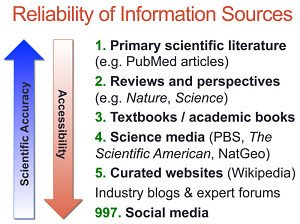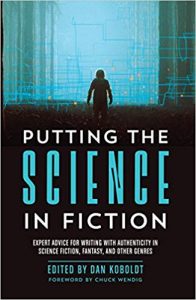 Today’s guest post is by novelist Dan Koboldt (@DanKoboldt), author of Putting the Science in Fiction.
Today’s guest post is by novelist Dan Koboldt (@DanKoboldt), author of Putting the Science in Fiction.
Science and technology are fundamental elements of many literary genres. Unfortunately, the depictions of these subjects in books and movies are entirely fiction. A classic example of this is in the movie Avatar, when the character played by Sigourney Weaver uses a micropipette. These hand-held instruments are used in a laboratory to move tiny, precise amounts of liquid from one tube to another. They’re a vital—and expensive—piece of lab equipment. There’s just one rule for using a micropipette: they must be held upright. If you turn a micropipette upside down, the liquid that it just picked up will get into the mechanism. And that’s exactly what Sigourney Weaver did while using a micropipette in Avatar. Amusingly, the makers of that micropipette, Eppendorf, even chided them about it on Twitter. The amount of lab equipment that’s irreparably destroyed on-screen would give university accountants a heart attack. Space explosions are another trope with no basis in real-world science. Space is a vacuum, so spaceships (and death stars) don’t explode in massive fireballs (fire requires oxygen). Realistically, a spaceship that loses hull integrity would decompress and implode. Oh, and you wouldn’t hear an explosion either, because sound waves also can’t travel through space’s vacuum.
Researching Your Writing: Source Reliability
 These are just a few of the misconceptions that pervade popular science fiction. Many, if not most, could have been avoided if the writers spent some time doing research. During this crucial phase, not all sources are created equal. Let’s take a brief tour of the various places you might get information, from most accurate to least. The most scientifically accurate sources are the papers published in peer-reviewed journals, but these can be pretty dry for the casual reader. I personally read a lot of scientific reviews, which summarize the current state of knowledge about a topic while drawing on that literature. After that, textbooks and reference books tend to be very reliable information, though these (let’s be honest) are prohibitively expensive. Science media aimed at a general audience—such as PBS, The Scientific American, and National Geographic—lose some of the nuance, but are much more accessible to non-technical readers. Curated websites like Wikipedia are nice resources for casual reading and research, and tend to be updated as new discoveries emerge. Still, these are written and maintained by the general public, so use with caution. You’ll note that social media ranks as #997 in terms of scientific accuracy. Remember, social media companies are for-profit organizations. You don’t pay to use them, because you are the product. An increasing proportion of the “sources” you may encounter have paid to show up in your feed or search results. Simply put, anything served to you by a social media network should not be treated as factual information. Especially when you’re performing research that you plan to use for your own work.
These are just a few of the misconceptions that pervade popular science fiction. Many, if not most, could have been avoided if the writers spent some time doing research. During this crucial phase, not all sources are created equal. Let’s take a brief tour of the various places you might get information, from most accurate to least. The most scientifically accurate sources are the papers published in peer-reviewed journals, but these can be pretty dry for the casual reader. I personally read a lot of scientific reviews, which summarize the current state of knowledge about a topic while drawing on that literature. After that, textbooks and reference books tend to be very reliable information, though these (let’s be honest) are prohibitively expensive. Science media aimed at a general audience—such as PBS, The Scientific American, and National Geographic—lose some of the nuance, but are much more accessible to non-technical readers. Curated websites like Wikipedia are nice resources for casual reading and research, and tend to be updated as new discoveries emerge. Still, these are written and maintained by the general public, so use with caution. You’ll note that social media ranks as #997 in terms of scientific accuracy. Remember, social media companies are for-profit organizations. You don’t pay to use them, because you are the product. An increasing proportion of the “sources” you may encounter have paid to show up in your feed or search results. Simply put, anything served to you by a social media network should not be treated as factual information. Especially when you’re performing research that you plan to use for your own work.
How and Why to Ask an Expert
All of the things I’ve discussed so far are passive research sources—that is, materials you go find and read on your own. However, one of the best ways to research your writing is to ask a real-world expert. I do this all the time. For the past few years, I’ve hosted guest posts from numerous experts for my Science in Sci-fi, Fact in Fantasy blog series. If I need spaceship design advice, I can ask a Boeing engineer. If I need to know something about brains, I ask my go-to neuroscientist. This works well for two reasons: first, because real-world experts are usually versed in the current state of the art for their field. They don’t just read those research papers; they write some of them. Second, most scientists, engineers, and other professionals love talking about their work. All you need to do is find one and approach them the right way. If you’d like to ask an expert for advice, here are some tips to make sure it’s a pleasant experience for all parties involved:
- Do your homework. Give some thought to the technical subject in question (and how it applies to your story) before you start the conversation.
- Briefly provide some context. In a few sentences, summarize your story and how the technical element comes into play. This will help the expert understand what you’re looking for.
- Be considerate of their time. Experts don’t exist for the sole purpose of answering writers’ questions, so don’t monopolize their time. Keep your interaction polite, concise, and respectful.
- Recognize that you might need a different expert. People who work in medicine, science, and other technical fields tend to specialize. You might find out in the course of conversation that you need a different type of expert.
 Balancing Accuracy with Story
Balancing Accuracy with Story
You’ll probably get far more information from your research than you can actually use in your writing. It’s up to you to select the most important elements to convey on the page, and to leave the rest out. If you have to choose between telling a great story and being technically accurate, go with the former. Story should come first.
If you enjoyed this post, I highly recommend Dan Koboldt’s Putting the Science in Fiction. It’s a collection of expert advice from scientists, engineers, medical professionals, tech experts and more, who debunk the myths, correct the misconceptions, and help writers create more realistic yet engaging stories to satisfy discerning readers.
Dan Koboldt is the author of the Gateways to Alissia trilogy (Harper Voyager) and the editor of Putting the Science in Fiction (Writers Digest, 2018). As a genetics researcher, he has co-authored more than 70 publications in Nature, Science, The New England Journal of Medicine, and other scientific journals. Dan is also an avid hunter and outdoorsman. Every October, he disappears into the woods to pursue whitetail deer with bow and arrow. He lives with his wife and children in Ohio, where the deer take their revenge by eating the flowers in his backyard.

And as you no doubt know the horrible inaccuracies can ruin a piece for someone who realizes how far from the truth a description is.
Taking the research into prose is the difficult part for me.
[…] Research of some kind is needed for almost every story. J. Kathleen Cheney tells us how to start the worldbuilding and research…and when to stop, while Dan Koboldt focuses on how to research your writing to ensure technical accuracy. […]
For me, technical accuracy in books is essential. I write mostly historical fiction, which means copious amounts of research just to get the era right: garb, weapons, food, etc. But a comparison to “Star Wars” does not and is never going to fly (pun intended). Why not? In fiction, I have the space (ugh, I’ll quit) to explain why there is or is not an explosion, sound, etc. I can even try to make that explanation interesting. George Lucas wanted to make his movies as close to the war and other movies he had admired as a boy, and knew very well those were inaccuracies. However, the most important rule of entertainment is . . . well, entertainment. In a movie, no sound and minimized action means “DULL” unless it creates tension in the audience. In addition, for some character to explain why there would be no sound or pyrotechnics would be pedantic, i.e., boring. As to the micropipette, yes: that was totally ridiculous visually, and no explanation would have been necessary. So, carp about technical inaccuracies all you want, but film makes are going to ignore you. Stick with novels, where knowledgeable readers can and will dissect every mistake you make.
“Science and technology are fundamental elements of many literary genres. Unfortunately, the depictions of these subjects in books and movies are entirely fiction.”
Entirely? Really? NEVER factual? A hyperbolic claim, to put it mildly.
And why would a spaceship full of air and fuel not explode in flames into a vacuum? It’s not a submarine, in fact the very opposite, more like a high-flying aircraft in the very low pressure at altitude. And micropipettes may very well work differently in the future in which ‘Avatar’ is set.
Your research suggestions are quite informative, though I would add that nobody is infallible or totally neutral. Just about everybody has an ax to grind at times, including scientists. While for-profit organizations are influenced by that profit, ALL the sources you list are financed by somebody, and he who pays the piper calls the tune. So ALL important information and claims need consideration and questioning.
Thanks for this!
I can take wild speculation in Sci-Fi and crazy stuff in fantasy, but historical fiction, biography, etc. needs to be accurate, within reason. No cell phones in Daniel Boone’s leather boots. I won’t quibble on whether or not he wore a coonskin cap, though.
I’ve been complaining about the pipette scene in avatar for yeeeaars